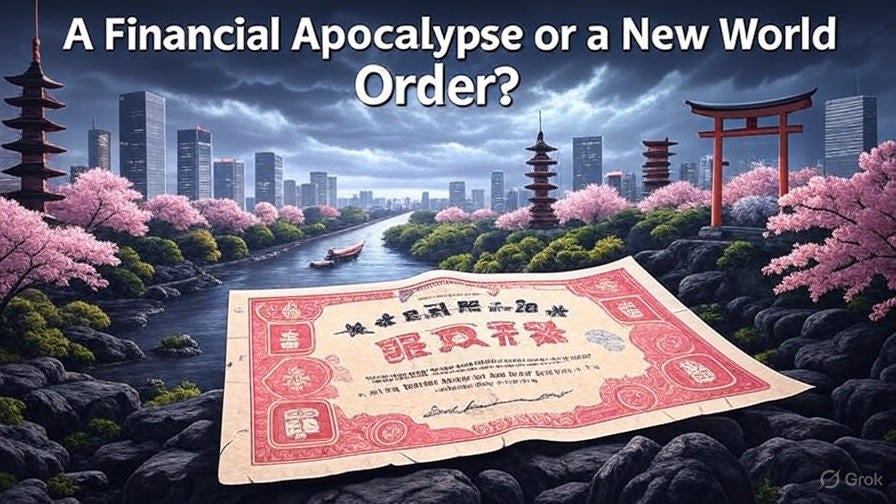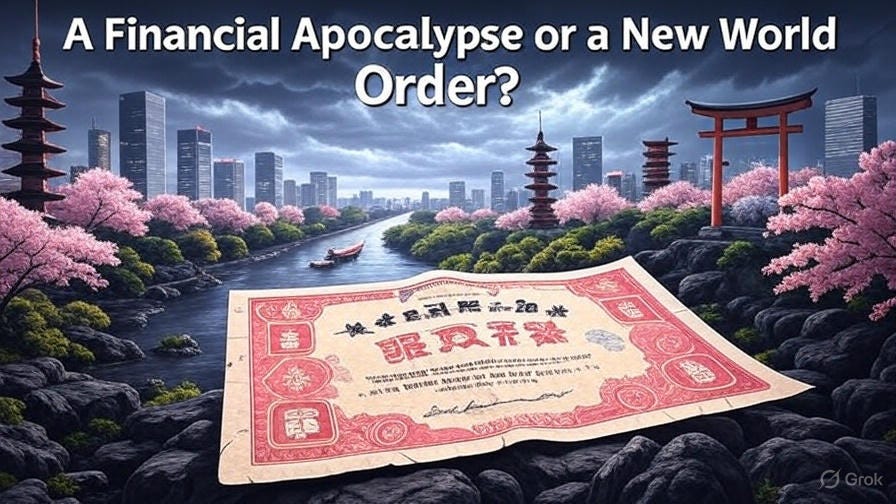

Introduction: The Global Financial Order Is Crumbling
The world is fracturing. Trade wars, tariffs, and nationalist policies are tearing apart the interconnected global economy that once fueled prosperity. Deglobalization—the deliberate unwinding of global trade and capital flows—is no longer a buzzword; it’s a wrecking ball smashing through the foundations of financial markets. Nowhere is this more evident than in the bond market, where yields are spiking, demand is collapsing, and investors are running for cover. From Japan’s imploding JGB market to the U.S. Treasury’s yield surge, deglobalization is rewriting the rules of fixed-income investing. Is this the dawn of a new, chaotic financial order, or a necessary reset to protect national economies? Buckle up—this is a fight for the future of global finance, and the bond market is ground zero.
The Deglobalization Tsunami: What’s Driving It?
Deglobalization isn’t an accident; it’s a policy choice fueled by political upheaval and economic nationalism. In 2025, the world is witnessing:
-
Trump’s Tariff Tantrum: President Trump’s 10% baseline tariff on imports and a reduced 30% tariff on Chinese goods have sent shockwaves through global markets. His threats against the EU and companies like Apple have triggered sell-offs and rallies, leaving investors dizzy. Posts on X call it “economic warfare,” with some cheering the protectionism and others warning of a global recession.
-
Japan’s Bond Market Meltdown: Japan’s super-long JGB yields hit record highs (30-year at 3.15%), with life insurers like Nippon Life hemorrhaging ¥3.6 trillion in unrealized losses. The Bank of Japan’s retreat from yield curve control and reduced bond purchases signal a shift away from global coordination, amplifying volatility.
-
Global Pushback: From Europe’s retaliatory trade measures to China’s strategic decoupling, nations are prioritizing self-sufficiency over interdependence. The EU’s consideration of tariffs on U.S. goods and India’s push for domestic manufacturing are dismantling decades of globalization.
Why is this controversial? Proponents argue deglobalization protects jobs and national security, breaking the stranglehold of global elites. Critics scream it’s a recipe for inflation, supply chain chaos, and economic collapse. The bond market, caught in the crossfire, is where these ideological battles manifest as financial carnage.
Bond Markets in the Crosshairs: Chaos Unleashed
Deglobalization is gut-punching bond markets worldwide, and the fallout is brutal:
-
Yield Spikes and Demand Collapse: Rising trade barriers reduce global capital flows, forcing governments to offer higher yields to attract investors. The U.S. 30-year Treasury yield hit 5.09% in 2025, the highest since October 2023, while Japan’s 20-year JGB auction saw the weakest demand since 2012. X posts scream of a “bond market implosion,” with investors fleeing long-dated debt.
-
Japan’s Warning Shot: Japan’s bond market turmoil is a canary in the coal mine. Life insurers, holding 13% of JGBs, are drowning in losses as yields soar. The Ministry of Finance’s desperate move to shift to shorter-dated bonds signals panic, not control. If Japan—the world’s third-largest economy—can’t stabilize its bond market, what hope is there for smaller players?
-
U.S. Debt Crisis Looming: Moody’s downgrade of the U.S. credit rating has amplified fears of a debt spiral. With Trump’s tax cuts and tariffs bloating the deficit, Federal Reserve Governor Christopher Waller warns that markets will demand higher yields, squeezing borrowers and investors alike. Is this the beginning of a U.S. debt crisis, or just fearmongering?
The controversy? Some see rising yields as a healthy correction, forcing fiscal discipline. Others view them as a death knell for affordable borrowing, predicting defaults and market crashes. One thing is clear: deglobalization is strangling the liquidity that once kept bond markets afloat.
The Winners and Losers: Who Survives the Deglobalization Bloodbath?
Deglobalization is a zero-sum game, and the bond market’s casualties are piling up:
-
Losers:
-
Life Insurers: Japan’s insurers, like Nippon Life and Meiji Yasuda, are bleeding billions in unrealized losses. Their duration mismatches expose a fatal flaw in their business model, and selling bonds to cut losses only locks in the pain.
-
Emerging Markets: Reduced global capital flows hit emerging economies hardest, as investors shun riskier bonds. Countries like Argentina and Turkey face soaring borrowing costs, teetering on the edge of default.
-
Global Investors: Pension funds and asset managers reliant on stable bond yields are seeing portfolios shredded. The dream of “safe” fixed-income investments is dead.
-
-
Winners:
-
Hedge Funds and Speculators: Those betting on volatility are raking in profits as yields swing wildly. Shorting long-dated bonds has become a lucrative play.
-
Domestic-Focused Economies: Nations like India, pushing self-reliance, may benefit from reduced exposure to global shocks, attracting bond investors seeking stability.
-
Inflation Hawks: Central banks tightening policy to combat inflation (3.6% in Japan, above the BOJ’s 2% target) are emboldened, arguing deglobalization justifies higher rates.
-
The controversy lies in the stark divide: deglobalization’s champions see it as a path to sovereignty, while detractors warn it’s a financial guillotine for vulnerable economies and investors.
The Global Ripple Effect: A New Financial Dark Age?
Deglobalization’s impact on bond markets isn’t just a numbers game—it’s a geopolitical earthquake. Consider the fallout:
-
Global Liquidity Crunch: Reduced trade and capital flows shrink the pool of investable funds, driving up borrowing costs worldwide. The IMF warns of slower global growth, with bond markets bearing the brunt.
-
Central Bank Dilemma: The BOJ and Federal Reserve face impossible choices—keep rates low and risk inflation, or let yields rise and choke economic recovery. X posts accuse central banks of “selling out” to nationalist agendas, fueling distrust.
-
Investor Panic: The flight from long-dated bonds signals a loss of faith in government debt. If Japan and the U.S.—pillars of the global bond market—falter, where can investors hide?
The debate rages: Is deglobalization a necessary evil to restore economic sovereignty, or a reckless gamble that could plunge the world into a financial dark age? Social media is ablaze with doomsayers predicting a “global bond market collapse” and optimists touting a “new era of self-reliance.” Who’s right?
A Call to Action: Navigate or Perish
The bond market’s turmoil isn’t a distant problem—it’s a wake-up call for investors, policymakers, and executives. Here’s what you need to do:
-
Diversify Now: Shift away from long-dated bonds to shorter maturities or alternative assets like commodities. The days of blindly buying government debt are over.
-
Watch Japan Closely: The MOF’s June consultations and upcoming 40-year JGB auction (May 28, 2025) will signal whether stabilization is possible or if the crisis deepens.
-
Demand Transparency: Central banks and governments must clarify their strategies. Are they prioritizing national interests or global stability? Investors deserve answers.
This isn’t just a market correction; it’s a paradigm shift. Deglobalization is rewriting the rules of finance, and the bond market is the first casualty. Will you adapt to this new world order, or be swept away by the chaos?
Conclusion: The Fight for the Future
Deglobalization is tearing apart the global bond market, exposing vulnerabilities from Tokyo to Washington. Rising yields, collapsing demand, and massive losses for institutions like Japan’s life insurers are just the beginning. This isn’t a blip—it’s a battle between globalism and nationalism, with trillions at stake. Are we headed for a financial apocalypse, or is this the painful birth of a more resilient, self-sufficient world? The answer depends on who you ask, but one thing is certain: ignoring this crisis is not an option.
What’s your take? Is deglobalization a disaster for bond markets, or a chance to rebuild stronger? Drop your thoughts below and share this article to spark the debate. #Finance #BondMarket #Deglobalization #Investing #Economy
This post is originally published on ROADTOMILLION.
